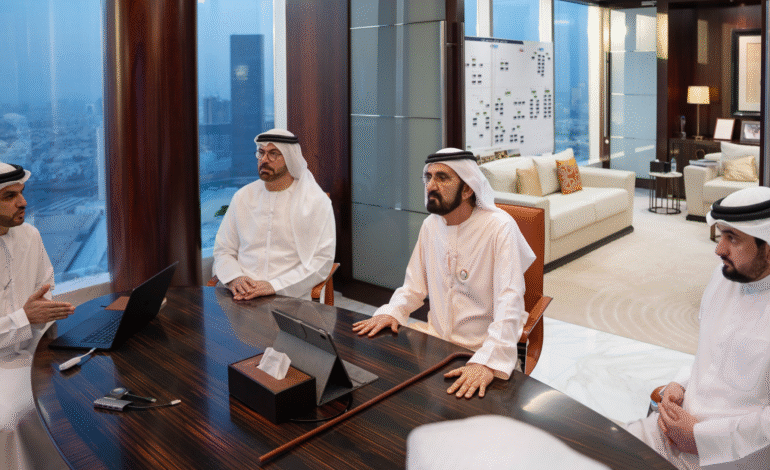UAE Launches AI-Driven System for Better Government Performance by 2031

On July 9, 2025, His Highness Sheikh Mohammed bin Rashid Al Maktoum, Vice President, Prime Minister of the UAE, and Ruler of Dubai, announced a groundbreaking AI-driven government performance measurement system for the UAE’s Federal Government. This innovative initiative, shared via Sheikh Mohammed’s official X account, marks a significant leap in the UAE’s journey toward smart governance, leveraging artificial intelligence to enhance decision-making, streamline strategic planning, and anticipate future challenges. This system aligns with the UAE’s We the UAE 2031 Vision, emphasizing agile governance, resource optimization, and continuous improvement. At Hammermindset.com, we dive into the details of this transformative system, exploring its implications for the UAE’s government efficiency and global leadership in AI integration.
The UAE’s Vision for Smarter Governance
The UAE has long been a pioneer in adopting cutting-edge technologies to redefine governance. The newly launched performance measurement system is designed to revolutionize how the Federal Government operates, ensuring it remains adaptable in a rapidly evolving global landscape. By incorporating AI algorithms, the system empowers government entities to make data-driven decisions, track the progress of national strategies, and proactively address future opportunities and challenges. This initiative reflects the UAE’s commitment to innovation, positioning it as a global leader in AI-powered governance.
Sheikh Mohammed emphasized that continuous improvement is a cornerstone of the UAE’s government ethos. “There is no perfect system, but everything can be developed and improved,” he stated, highlighting the nation’s dedication to evolving tools and methodologies to serve its people better. This mindset aligns with the UAE’s broader ambition to create a smarter, faster, and more efficient government, as outlined in the We the UAE 2031 Vision.
Key Features of the AI-Driven Performance System
The new government performance system is built on three core pillars:
- Decision-Making Support: The system uses AI algorithms to analyze vast datasets, providing real-time insights to guide policymakers. This ensures decisions are informed, timely, and aligned with national priorities.
- Tracking Plans and Strategies: By monitoring the implementation of federal strategies, the system ensures that goals are met efficiently, with measurable outcomes that drive sustainable development.
- Anticipating Future Challenges: Leveraging predictive analytics, the system enables the government to foresee potential obstacles and opportunities, fostering proactive governance.
These features make the system a powerful tool for enhancing government efficiency, reducing bureaucratic delays, and optimizing resource management. As Sheikh Mohammed noted, modern governance success hinges on regulatory agility, streamlined processes, and intelligent resource use—tasks that this AI-powered system is designed to excel at.
Alignment with the We the UAE 2031 Vision
The We the UAE 2031 Vision is a comprehensive roadmap to position the UAE as a global hub for innovation, sustainability, and economic diversification. The new performance system is a critical component of this vision, integrating artificial intelligence to streamline processes and enhance financial efficiency. On July 6, 2025, Sheikh Mohammed announced the Federal Government Strategic Plan 2031, which emphasizes AI integration, process simplification, and resource optimization. The performance system complements this plan by providing a robust framework to monitor and achieve these goals.
The strategic plan, as reported by the Dubai Media Office, marks a shift from traditional governance metrics, such as regulatory complexity, to modern benchmarks like efficiency and agility. This aligns with the UAE’s ambition to become the world’s first fully AI-powered government by 2027, as outlined in Abu Dhabi’s Digital Strategy 2025-2027 []. The performance system’s ability to track progress in real time ensures that the UAE remains on course to achieve these ambitious targets.
The Role of AI in UAE Governance
The UAE has been at the forefront of AI adoption since appointing the world’s first Minister of State for Artificial Intelligence, Omar Al Olama, in 2017 []. The establishment of the Mohamed bin Zayed University of Artificial Intelligence in 2019 and the National Artificial Intelligence Strategy further underscore the nation’s commitment to becoming a global leader in AI by 2031 []. The new performance system builds on these foundations, embedding AI technology into the core of federal governance.
In a significant move, the UAE announced in June 2025 that the National Artificial Intelligence System will serve as an advisory member of the UAE Cabinet, Ministerial Development Council, and federal boards starting in January 2026 [,]. This integration of AI into high-level decision-making reflects the UAE’s forward-thinking approach to governance, ensuring that data-driven insights inform policies that impact millions.
Why This System Matters
The introduction of the AI-driven performance system is a game-changer for several reasons:
- Enhanced Efficiency: By automating data analysis and performance tracking, the system reduces manual processes, saving time and resources.
- Proactive Governance: The use of predictive analytics allows the government to anticipate and mitigate challenges before they escalate.
- Global Leadership: The UAE’s adoption of AI in governance sets a benchmark for other nations, reinforcing its position as a hub for innovation and technology.
- Public Trust: Operating within a sovereign, ethical, and encrypted framework, the system ensures transparency and accountability, addressing concerns about black-box algorithms [].
This initiative is particularly timely in an era of rapid global changes, where agile governance is essential for maintaining public trust and achieving sustainable development []. As the Organisation for Economic Co-operation and Development (OECD) emphasizes, agility is the new legitimacy for governments facing climate, health, and geopolitical shocks [].
The UAE’s Broader AI Ecosystem
The performance system is part of a larger ecosystem of AI-driven initiatives in the UAE. The nation’s strategic focus on artificial intelligence spans multiple sectors, including healthcare, education, and visa processing. For instance, the UAE’s Golden Visa program now uses AI-powered processing to attract global talent in AI, climate tech, and technology sectors . Similarly, the Ministry of Education has launched AI-based assessments for educators to enhance professional development.
The UAE’s digital infrastructure, ranked second globally for digital nomads in 2025, supports these initiatives with high-speed internet and co-working spaces . This robust infrastructure ensures that AI systems, like the new performance measurement tool, operate seamlessly, delivering real-time results that drive government efficiency.
Challenges and Opportunities
Implementing an AI-driven performance system is not without challenges. Integrating AI algorithms across diverse federal entities requires significant technical expertise and infrastructure upgrades. Additionally, ensuring data privacy and ethical AI use is critical to maintaining public trust. The UAE’s commitment to a sovereign and encrypted framework addresses these concerns, but ongoing vigilance is necessary to prevent data breaches or algorithmic biases .
However, the opportunities far outweigh the challenges. The system’s ability to provide real-time insights and predictive analytics empowers the government to make informed decisions quickly. This is particularly valuable in areas like resource allocation, where intelligent management can lead to significant cost savings. Moreover, by setting a global standard for AI in governance, the UAE can attract international talent and investment, further boosting its economic diversification efforts .
Global Context and Comparisons
The UAE’s AI-driven governance model is unique but aligns with global trends toward smart government. Countries like Singapore and Estonia have also embraced digital transformation, but the UAE’s focus on AI integration at the federal level sets it apart. The partnership with the World Economic Forum to launch a global AI regulatory platform further demonstrates the UAE’s commitment to shaping international standards for emerging technologies .
Unlike traditional performance systems that rely on manual reporting, the UAE’s system leverages AI algorithms to deliver real-time analytics, making it more efficient and responsive. This approach positions the UAE as a leader in the Fourth Industrial Revolution, where AI, big data, and automation are transforming governance worldwide.
The Role of Leadership in Driving Innovation
Sheikh Mohammed’s leadership has been instrumental in driving the UAE’s AI agenda. His directive to shorten the strategic planning cycle from five to three years ensures that the government remains flexible and responsive to global changes []. By prioritizing AI integration, Sheikh Mohammed is steering the UAE toward a future where technology and governance are seamlessly intertwined.
Other key figures, such as Huda Al Hashimi, Head of Strategy and Government Innovation, and Sheikh Ahmed bin Mohammed bin Rashid Al Maktoum, Chairman of the Dubai Media Council, have also played critical roles in advancing the We the UAE 2031 Vision []. Their efforts ensure that the performance system is not just a technological tool but a catalyst for national transformation.
Future Implications for the UAE
The AI-driven performance system is a stepping stone toward a fully AI-powered government by 2027. As the UAE continues to invest in AI research and digital infrastructure, the system will likely evolve, incorporating advanced features like machine learning and natural language processing. This could enable even more sophisticated predictive models, further enhancing government efficiency.
For citizens, the system promises faster services, transparent governance, and a government that anticipates their needs. For businesses, it creates a stable and innovative environment, attracting global investment and fostering economic growth. For the international community, the UAE’s model offers a blueprint for integrating AI into governance, potentially influencing policies worldwide.







